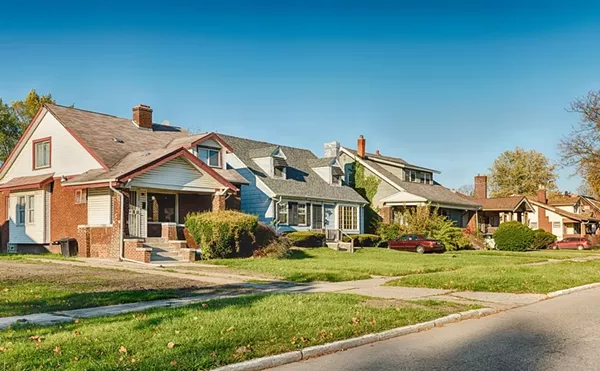
Audio By Carbonatix
[
{
"name": "GPT - Leaderboard - Inline - Content",
"component": "35519556",
"insertPoint": "5th",
"startingPoint": "3",
"requiredCountToDisplay": "3",
"maxInsertions": 100,
"adList": [
{
"adPreset": "LeaderboardInline"
}
]
}
]
The first thing you'll notice about Burn: One Year on the Frontlines of the Battle to Save Detroit is the extremely intimate view the film offers of the day-to-day grind of fighting fires in the city. Directors Brenna Sanchez and Tom Putnam made it a point to ensure that those who saw the film felt what the firefighters were experiencing. For all of the films and books about Detroit that have come out in the past few years, this is one especially worth checking out. We chatted with Sanchez about the experience of shooting the film and what their inspiration was for pursuing it, when everyone they talked to said it would be a near-impossible feat.
Metro Times: For those who haven't seen the film, can you talk a little about what drew you to telling this story?
Brenna Sanchez: Well, I'm from Detroit and in 2008, a Detroit firefighter named Walter Harris died fighting a fire in an abandoned home — it was an arson fire. My partner Tom Putnam and I couldn't understand why. It was a multilayered thing: why someone would risk his life in an abandoned home, first and foremost, because Detroit is a city with — pick your statistic — 80,000 abandoned structures, why Detroit firefighters were still risking their lives for abandoned homes. Also, in a city with — again, statistics are greasy and slippery — but with as many arsons, arguably more than anywhere else in the country. Any wider than that, we don't know. As civilians, we just couldn't understand it. I literally was home for Christmas break and just walked into my old firehouse down on Alexandrine and just started asking questions.
MT: You say you learned a lot of things that didn't make it into the movie. What were some of the more fascinating aspects that you learned about once you started diving in?
Sanchez: The notion of firefighters that we, as civilians, have is very defined by the media — by movies and television, so I was very surprised to go out with them and see just how many of the fires were arson, which — non-arson fires start in a very limited number of ways. I mean, you're cooking, you're smoking, there's a candle lit, but they're all started by everyday life. By people doing things that start fires — human error. We went to an overwhelming number of fires in places where people don't live. I'm not an investigator, and most of those fires they wouldn't have time to investigate, but your common powers of deduction tell you that's an arson fire because they're started in a place where no one is living. There's no fireplace, and then the obvious arsons where you find the Molotov cocktail or you find the gas cans — that's a whole other level, but just the overwhelming number of arsons was shocking. We were with them for 14 months; we went on hundreds of fire calls — and I haven't read the numbers, so I don't have hard statistics — but we went to very few fires that were in occupied structures that seemed like natural fires, that seemed like non-arson related fires.
MT: One of the things that made the film more of a genuine experience in and of itself, of course, was placing cameras literally on the heads of some of the firefighters. Can you talk a little bit about what spurred that idea? What type of obstacles, if any, are there to equipping them with that sort of setup?
Sanchez: Sure. I think our motivation was simple: To us, we'd never seen a firefighter documentary, and we wanted it to be as complete as possible — as immersive. We wanted to feel what that experience was like. When making that documentary, we wanted it to be as authentic as possible and we wanted to go where they went. I have to say; it was the same motivation that made us go in the pool with Doogie (Brendan Milewski) and made us go ... all the places we went to that were not fire-related, we operated the same way. We want to go everywhere these guys go. We want to immerse ourselves in what they do and who they are because, again, with the media, film, and television, we've never seen that before. We see their humor, we see their shiny trucks, we have this defined image of who they are, and I've never seen anything like that.
MT: That's the most incredible part of the film, by far: the uniqueness of it all.
Sanchez: Yeah, as far as I know, we were the first people to do it. I certainly had never seen it before; Tom hadn't. As far as the challenges, the firefighters were — they're genuinely of a type. They're generally type A personalities and they wanted to get the best shots, so we'd come back — after a fire, we'd come back to the station and we'd quick download the footage and have them look at the dailies, and they'd sit there and critique their performance as cameraman. Of course, we were always saying, "You guys, don't worry about the cameras. You fight the fires, we'll keep the cameras," but they want to do things really well so they're on their game in terms of being cameramen. The cameras we used were donated by a company named Contour HD, and we chose them over GoPro, which is a question we get a lot, because GoPros are very ostentatious; they're big and they're silver and they're square. The Contours were sleek and black, and they looked like a flashlight or they looked like they just fit well with the firefighters helmets. They're not heat-rated; we tried to bake a couple before we shot to see what they'd do in heat. We didn't get much reaction from that, so we didn't know how they'd hold up. They're fine. We melted on/off buttons but they still worked, we had to change lenses that got smoky, but that was fine. They sold parts for that. So, they just worked beautifully. There were no terrific challenges.
MT: I find it interesting that you say the film offers a different experience unlike what you're so accustomed to in media. I wrote a review of the film, and the way I tied it off is that I grew up in Livonia before moving here, and it struck me when I was watching it because it hit me that my only real connection to the act of arson in Detroit was on the six o'clock news. The reporters stand on the street and say, "There's a fire here" and 30 seconds later they're talking about the Lions game. It's sort of bizarre when you take that into consideration: how simple they make it out to be when it's this very loaded incident.
Sanchez: This is not a critique of the media by any stretch, but there aren't the budgets to research stories like that. We're not seeing award-winning news reporting on the six o'clock news, and we don't have the attention span for it. It is what it is. It's not a critique. But when you have an opportunity like we did, we had the freedom of not having any money when we started and calling our own shots and not having owners. So we were able to do the things that all the people who we went to for money said couldn't be done. There was a certain freedom in that. It's just a more complex story. I mean, my gosh, we had to work so hard to make the movie understandable. We left so much out. Every cut, we just had to refine it and refine it. Refine that information out because it was information overload. That's the nature of the story: There's so much information, we can't wrap your head around it. It's too much.
MT: I know most of the responses on the film have been positive, but did you receive any sort of response from residents themselves, and what kind of impact has it had on those who talk to you outside of the firefighters that were involved?
Sanchez: That's a tough one, because I don't think that's an audience that we were ever able to reach. We tried to do a deal with the city. The city has a TV station — two TV stations actually, and we offered to the previous administration. We said, "Hey, we'll sell you the rights to show our movie for a dollar on both your channels," and it just never took place. That was our goal from the beginning: "If we don't get a TV broadcast deal where anyone can see this, we want to figure out a way." We came up with all sorts of ideas like sending out DVDs and basic packaging, giving them away at firehouses to get the residents to see. That's who really needed to see it. I think we fell short in that mission, unfortunately. I know a lot of residents came to the screening, but I think they were not people from the neighborhoods. They were people who were more upper-middle class or middle class who are reading and listening a little bit more than the people who are actually in the neighborhoods.
MT: Would you ever consider revisiting the topic?
Sanchez: Oh, we'd love to! We worked so hard and so long and raising the money — it was a really hard movie to make. Anyone I know who's made a film who I'm close to and we speak — Apocalypse Now — I heard that was a challenging movie to make. Not comparing us to Coppola, but the level of challenge was so far beyond anything. We were told that we couldn't do it, but we didn't know better. There was some idea going in of how challenging it would be. It was so difficult and the money was so tough to find. I don't think we could do it again. We just couldn't. There isn't money for it. People don't understand how expensive even an independent film is. People hear money thrown around and they think it's a king's ransom and it is if you're trying to buy a house somewhere, but to make a movie it's really, incredibly expensive. It requires a lot of highly skilled people who — we've had to hire actually skilled camera people to be able to capture the footage that we captured. We had to have them working long hours, we had to pay them, and we had to feed them, and you have to ... tremendous and tremendous expense. ... It's not like we're saying it's so expensive from our ivory tower. It's actually real money that adds up like crazy. We'd love to [revisit the topic]. I'm from Detroit, I want to move back there; I'd move back there tomorrow. Tom loves Detroit; he'd move there tomorrow. Our movie that we're making now is in Detroit, like we're coming there next week to make a movie. Our next documentary is about ICP and the FBI.
MT: What would you say to residents who might read this story? What might they get out of the movie and why should they go see it?
Sanchez: I think as a civilian — I can't overstate the importance of Tom and I making this film as civilians because we learned a lot of things that we wish and the firefighters wish that people knew. Firefighters are a very close-knit group; they don't talk a lot, they don't complain about what they have to do every day. I think Burn, from what I understand, captures what it is they go through. Short of training yourself to be a firefighter, it's important to know what the people around you are going through. I think if residents could understand what firefighters do beyond what the media tells us they do, they'd vote differently, they'd think differently about their own homes and how they operate in the homes, and they'd be more, I think, thoughtful and aware of things that you forget about — I mean, [for instance] your battery in your smoke detector. That's a very simple thing.
MT: One of the things that I found fascinating to watch was how you found a way to humanize Don Austin throughout the course of the film. What did you make of Don Austin?
Sanchez: It's an unpopular opinion among Detroit firefighters. I really liked him. I think he was extremely smart. I think he's no-nonsense. I think what he wanted for the department was appropriate; however, he wasn't as much as a team player as he needed to be to work well in that environment. I think he maybe said things without thinking about them or realizing the effect they'd have on people. I think he was the right guy for the job, but not 100 percent. He definitely alienated a lot of people with his bedside manner. One-on-one, he was incredibly receptive. He could've — and probably should've — shut us down. He met with us; he spent a lot of time with us. He was always checking in, always monitoring what we were doing. He was just really open when he didn't have to be because he saw the big picture of, "If these two cats are doing what they say they're doing, and I'm going to ride her on them to make sure that happens, then this could be actually really good for the department." You know, he had a long game, which I don't think too many of us understand long game and that unique perspective.






